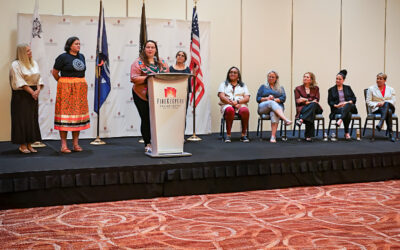“We’re already getting answers,” said NHBP Environmental Director John Rodwan during the first in-person Tribal/Kalamazoo District Department of Environmental, Great Lakes and Energy (EGLE) meeting, held on October 26, 2022, hosted by NHBP.
Staff members from the Pokagon Band and Gun Lake Tribe, more than a dozen staff from the Kalamazoo District EGLE, as well as EGLE Tribal Liaison Katie Lambeth, who works with all 12 Michigan Tribes, were in attendance. All were there to learn how EGLE and the Tribes can work more closely together to protect and restore the environment for the Next Seven Generations. Additionally, more than a dozen other EGLE and Tribal staff members attended via a Zoom meeting option.
“Very impressive turnout today,” Rodwan said. “Our last meetings have been completely virtual, so it’s nice to get together in person.”
Noting that the meetings with EGLE are still relatively new, Rodwan opened with a presentation highlighting the background and history of NHBP, including the Treaty Rights and the Cultural Significance of Mnomen {Wild Rice}. Building the foundation of understanding the Tribes’ sovereignty and history is paramount to the conversation moving forward with the State of Michigan employees and agencies.
“The waterways define who we are, and this is why they are important to us,” said Rodwan. “Today, we’re focused largely on natural resources programs because they integrate so much with our Culture and our Lifeways.”
Rodwan presented Culturally Inspired Restoration Actions to the group. One restoration effort featured was the Q Drive Prairie Reserve. It sits as an 80-acre parcel recently returned to a prairie state thanks to grant funding from Ducks Unlimited.
NHBP Habitat Restoration Specialist Steve Allen also shared important findings on Zizania Aquatica or Wild River Rice: “We are finding more and more Wild Rice all the time. We are utilizing aerial technology, including drones, to detect and locate more River Rice locations.”
NHBP staff also connected with the EGLE staff supervisors with their concerns regarding the possible releases from CAFOs (concentrated animal feeding operations) in the area.
“If you see this happening, we need to know that,” said District Supervisor, Water Resources Division Jennifer Klang. “We will take action.”
Allen, Rodwan and the other Tribal staff members posed several other questions and issues to EGLE about the process and chain of command at the state level regarding environmental issues, to which they were directed by those in the room to call or alert them personally. The immediate action and response will be beneficial moving forward when the Environmental Department sees or experiences issues in the future so that they can quickly resolve them at the state level.
Several future plans and visions were shared among the group as well.
“For many years, John and I have discussed reconnecting Nottawa Creek into the Pine Creek Marsh, but always with the caveat of the ‘what if’s and ‘wouldn’t that be great?’” said Allen.
As futuristic as reconnection plans may seem for NHBP, the Pokagon Band has proven that restoration can be a reality, as demonstrated through its work on a portion of the Dowagiac River.
Water Specialist Grant Poole, DNR for the Pokagon Band, presented on the completion of the First Phase of the Dowagiac River Mainstem Restoration, which occurred throughout summer and early fall 2022. Through support from many funding partners, the Pokagon Band removed a channel built in the early 1920s and replaced it with two meandering bends, allowing for a more natural river flow. The channelization process of the 1900s had stripped Dowagiac River of its meandering pathway and reduced wildlife habitats for the past 100 years.
Although Phase 1 was only .66 miles of channelization converted to 1.33 miles of meandering bends on the 100-mile river, it’s a start.
“We have restored 53 acres, so we have enhanced habitats for plants to be there,” said Poole. As the First Phase had just been completed a few weeks before the meeting, long-term benefits were not able to be reported yet. The next phase, Phase 2 of the project, will wrap up in 2023.
Gun Lake Tribe presented to the group its efforts to mitigate invasive species reported in Selkirk Lake and Indian Lake in Allegan County, Michigan.
After the formal presentations, Rodwan, Allen and NHBP Tribal Historic Preservation Officer Doug Taylor took the group on a site tour of The Reservation, where the EGLE staff could appreciate the beauty and splendor that Pine Creek provides for visitors in late fall. Rodwan reports that the next steps for these groups will be even more inclusive meetings to learn how to move forward with EGLE, the Michigan DNR and even more governmental agencies to protect and restore the Environment on an even larger scale for the next Seven Generations.




0 Comments